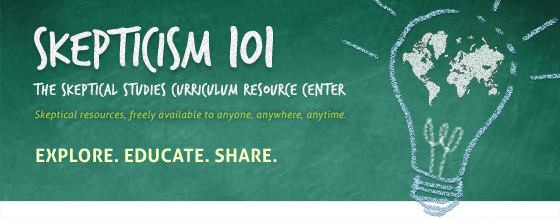 One of my favorite skeptics is Dr. Michael Shermer. Not just because we both have a psychology background, although that doesn’t hurt. And, not just because we are both avid bicyclists.(Because, well, I’m not at all. I know how to ride one, but when my good bike was stolen in the summer after my senior year of college, I couldn’t afford another one to replace it and got out of the habit, but that’s a whole ‘nother story.) I am a fan because he is a pioneer in the field of making skepticism accessible. As publisher of Skeptic Magazine, he has turned the all-seeing eye of skepticism on numerous topics, from UFOs to religion to crackpot psychological therapies. His numerous books are easily readable for most people, without being condescending or overly fluffy. I use Why People Believe Weird Things as one of the required texts in my course on Science vs. Pseudoscience because it is my one of my favorite introductions to the field of critical thinking and I consistently get feedback from students on how much they like it (as an aside, they consistently like it more than Sagan’s Demon Haunted World). In addition to his writings, Shermer is also a frequent guest on a variety of television programs, debates a variety of pseudoscientists on a regular basis, and even gave a TED talk a couple years ago.
One of my favorite skeptics is Dr. Michael Shermer. Not just because we both have a psychology background, although that doesn’t hurt. And, not just because we are both avid bicyclists.(Because, well, I’m not at all. I know how to ride one, but when my good bike was stolen in the summer after my senior year of college, I couldn’t afford another one to replace it and got out of the habit, but that’s a whole ‘nother story.) I am a fan because he is a pioneer in the field of making skepticism accessible. As publisher of Skeptic Magazine, he has turned the all-seeing eye of skepticism on numerous topics, from UFOs to religion to crackpot psychological therapies. His numerous books are easily readable for most people, without being condescending or overly fluffy. I use Why People Believe Weird Things as one of the required texts in my course on Science vs. Pseudoscience because it is my one of my favorite introductions to the field of critical thinking and I consistently get feedback from students on how much they like it (as an aside, they consistently like it more than Sagan’s Demon Haunted World). In addition to his writings, Shermer is also a frequent guest on a variety of television programs, debates a variety of pseudoscientists on a regular basis, and even gave a TED talk a couple years ago.
Last fall, I took some of my students to Houston to attend the Texas Freethought Conference (which was absolutely amazing) and was able to meet and chat with Shermer after he gave a couple of great lectures. When I told him that I use his book in my course, he gave me his email and asked if I could send him the syllabus, explaining that he was trying to gather resources to share with people interested in teaching others about skepticism. I was, of course, excited and eager to help. A few months later, Shermer contacted me and a number of other professors, speakers, and teachers of assorted kinds to tell us about a new project the Skeptic Society was launching: Skepticism 101.

Skepticism 101 is a clearinghouse of resources and information for anyone interested in teaching or learning about skepticism. It is also a bit of a change in how these things typically work, as most people view the lectures and presentations they create much like Gollum views the Ring (“My precious…..”). Given the amount of time and effort put into them, this is completely understandable (just speaking from my experience, I can spend 15 or more hours on a the lecture and slides for an hour long lecture). But, as Shermer said in an email to myself and other potential contributors:
“I know, many of you will be hesitant to share your Powerpoint/Keynote presentations. I used to be hesitant myself. I put a lot of work into them and after public talks people would often ask if they could have copies. I used to decline, but I have changed my mind after seeing the power of TED.com, the Khan Academy videos, and other educational sites where “Free” is the new model and “sharing” is the new strategy to change the world through more and better educational tools.”
Personally, this is already how I operate. I’ve been a copyfighter for quite some time now and think that information wants to be free. That’s why I post the lectures and other materials for all of my courses for anyone to see them, as well as leading the creation of two completely free, online textbooks that are Creative Commons licensed (even my two currently under-contract textbooks for publishing companies are going to be CC licensed, thanks to my insistence). So, it was excellent to see a huge name like Shermer jump on the sharing train.
Although only in beta testing, Skepticism 101 is already packed to the brim with resources: Powerpoint slides, sample syllabi, in-class projects, videos, and more are just waiting for people to use, adapt, and share. The topics range from ghosts to atheism, UFOs to the philosophy of science and pretty much any other topic you can imagine. This is a fantastic resource for the world’s skeptics, and it is growing day by day. I would recommend it for anyone wanting to learn about what it means to be a scientific skeptic, as well as how to present information from some really top-notch teachers.
